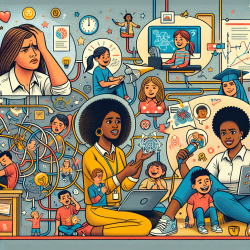The research article "Racism and Indigenous Adolescent Development: A Scoping Review" reveals significant insights into how racism affects the development of Indigenous adolescents. Conducted by Uink et al., this study highlights the need for educators and practitioners to be aware of these impacts and to implement strategies that can mitigate the negative effects of racism.
The Scope of the Review
The scoping review analyzed 32 studies from countries including the United States, Canada, Australia, and New Zealand. These studies primarily focused on self-reported experiences of racism, emphasizing perceived discrimination. The findings indicate that perceived discrimination has small to moderate effects on adolescent psychopathology and academic outcomes.
Key Findings
- Psychopathology: The quantitative studies reviewed suggest that perceived discrimination is linked to increased levels of anxiety, depression, and other mental health issues among Indigenous adolescents.
- Academic Outcomes: Racism negatively impacts academic performance, leading to lower grades and decreased motivation to succeed in school.
- Structural Racism: Qualitative studies shed light on structural forms of racism that are pervasive in educational systems and society at large, affecting Indigenous adolescents' sense of belonging and identity.
Recommendations for Practitioners
Based on these findings, practitioners working with Indigenous adolescents should consider the following strategies:
- Create Inclusive Environments: Schools should foster a culture of inclusivity where diversity is celebrated, and all students feel valued.
- Cultural Competency Training: Educators should undergo training to understand cultural differences and learn how to address racial biases effectively.
- Mental Health Support: Providing access to mental health resources tailored to the needs of Indigenous adolescents can help mitigate the psychological impacts of racism.
- Encourage Research: Further research is needed to explore the long-term effects of both overt and covert racism on Indigenous youth. Practitioners are encouraged to contribute to this body of knowledge by conducting studies or supporting research initiatives.
The Path Forward
The ultimate goal of research into racism's impact on Indigenous youth is not only to understand these dynamics but also to counteract and dismantle systems of oppression. By implementing the recommendations from this scoping review, practitioners can play a crucial role in promoting resilience and positive development among Indigenous adolescents.
If you're interested in delving deeper into this topic, I highly recommend reading the original research paper. It provides comprehensive insights that are invaluable for anyone working with Indigenous youth. To read the original research paper, please follow this link: Racism and Indigenous Adolescent Development: A Scoping Review.










